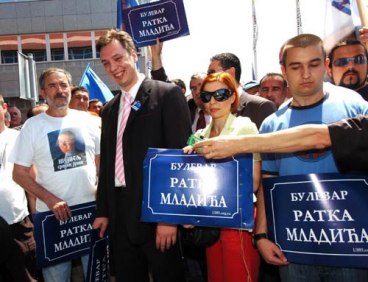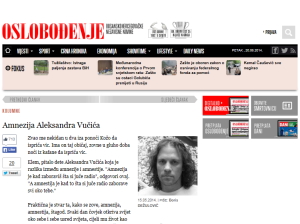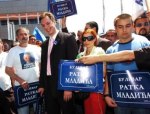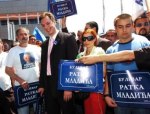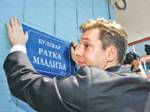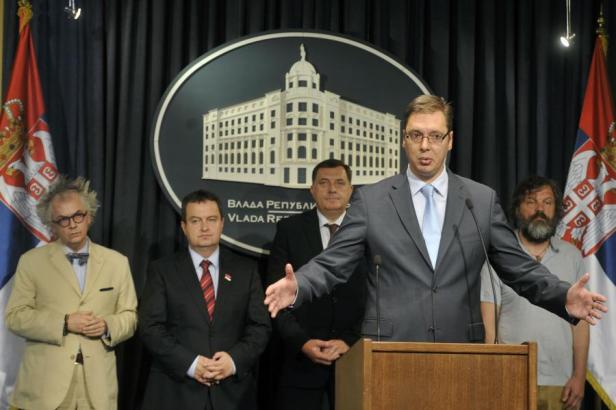
This column appeared originally on the website of the Bosnian daily Oslobodjenje 15/05/2014. It was written by award-winning Croatian writer Boris Dežulović. I had planned to translate it and post this article on my blog, however almost directly after Aleksandar Vučić ´s visit to Sarajevo and statements he made while there horrific floods hit Bosnia and Herzegovina, Croatia and Serbia causing damage worth millions and killing dozens of people, maybe more and eclipsed everything else that was going on at the time. In the time that has passed since then Vučić has made further controversial statements including remarks about the First World War Centenary Commemoration 21–28 June 2014 called: Sarajevo heart of Europe. Vučić refused to participate in the event giving to two reasons for his nonattendance, one, that he had some minor complaints about the program and that he would have preferred it if Bosnia and Serbia had done something together and the other reason was because he could not stand in front of plaque where it says “Serb fascist aggressor” he added that he cannot and does not wish to feel that way.
The plaque he was referring to was the one at the entrance of Sarajevo´s newly restored National Library. ( Or Vjecnica as it´s populary known) On 25th of August 1992, shelling from Bosnian Serb positions around Sarajevo caused the complete destruction of the building; among the things that went up in flame were 700 manuscripts and incunabula and a unique collection of Bosnian serial publications, some from the middle of the 19th century Bosnian cultural revival. Before the attack, the library held 1.5 million volumes and over 155,000 rare books and manuscripts. The destruction of the National Library is now widely seen as an example of Ubricide, one of many in the Bosnian War. The national library was seen as a cultural symbol of Bosnia and Herzegovina and spoke of a presence of a heterogeneous Bosnian culture and therefor had to be destroyed. Vjecnica was re-opened on 9th of May 2014, by the entrance a plaque reads: On this place Serbian Criminals in the night of 25th-26th August 1992 set on fire national and university’s library of Bosnia and Herzegovina. Over two million books, periodicals and documents vanished in the flame. Do not forget, remember and warn!
It´s understandable that Aleksandar Vučić might feel offended by that, however it´s does not make words on the plaque any less true, and it certainly does not say “fascist aggressor” even if one can’t not think of any reason not call the regime of Slobodan Milosevic and his clients in Bosnia and Herzegovina, Radovan Karadzic, Nikola Koljevic, Biljana Plavsic and Ratko Mladic fascist. They did jointly execute a campaign which caused the death and forcible relocation of thousands of people in Bosnia Herzegovina, Croatia and Kosovo. It´s might be difficult for Vucic to argue that the Milosevic regime was not a fascistic one and impossible for him to deny that nobody cheered more for a Greater Serbia then he did. Nor does Aleksandar Vučić´s disappointment somehow erase the fact that during the three and half year long siege of Sarajevo 11541 people were killed, of those 1601 were children. Approximately 50 000 people were wounded.
In May 1994, two years before the end of the siege, the most comprehensive UN-Report on the siege of Sarajevo was published. According to the report, the structural damage and damage to property in Sarajevo as a result of the siege included hospitals and other medical buildings and ambulances and medical personnel, doctors, nurses, ambulance drivers with more. Civilians have also been subjected to attacks, which can in no way be justified by the current state of war.
According to the report:
The siege has not spared any sector of Sarajevo’s population. UNICEF reported that of the estimated 65,000 to 80,000 children in the city: at least 40 per cent had been directly shot at by snipers; 51 per cent had seen someone killed; 39 per cent had seen one or more family members killed; 19 per cent had witnessed a massacre; 48 per cent had their home occupied by someone else; 73 per cent have had their home attacked or shelled; and 89 per cent had lived in underground shelters. It is probable that the psychological trauma suffered during the siege will bear heavily on the lives of these children in the years to come. (Civilian Casualties)
Nor does it mean that he was not a member of the Serbian Radical Party (SRS) from 1993 to 2008. Constantly by the side of Serbian ultranationalist and warmonger Vojislav Šešelj together with Tomislav Nikolic, the current president of Serbia and former member of the Serbian Radical Party (SRS) That could be the reason Aleksandar Vučić does not like to talk about the past. After his visit in Sarajevo in May he stated that he did not allow anybody to hold any lectures about the past. According toVučić “he could feel the distrust of some people, and that he felt that some people thought that he would be easy to talk to, that they could lecture him about the past, he did not allow that.”
Nevertheless that did not stop several pundits in the Balkans from pointing to what can only be described as Vučić´s selective amnesia. As I wrote above, one of those was award-winning writer Boris Dežulović in a column published in Bosnian daily Oslobodjenje 15/052014.
By Boris Dežulović
I got a call from Kožo the other day, he´d called me up to tell me a joke. He has a tendency to do that, calls you up in the middle of the night to tell you a joke. The joke goes; a child asked Aleksandar Vučić what´s the difference between amnesia and amnesty? Vučić replied; “Amnesia is when you forget what you did yesterday” and amnesty is when everybody else around you forgets what you did yesterday”
It´s a practical thing, amnesia, amnesty whatever. You rediscover the world around you every day, and your place in that world. Your entire life is like that box of chocolates from Forrest Gump. Amnesia is especially handy when it comes to politics. That´s why you´ll often hear politicians say “forget the past” That is their plea for amnesty: Amnesty is as you may have understood, a form of collective amnesia. Why would only their lives be a box of chocolates?
The only unfortunate thing is if “what he did yesterday” remains written down somewhere. As it happened during Vučić´s friendly visit to Sarajevo someone highly resentful revealed that the White Book, the party program of Vučić´s party SNS posted on the official site of the party, under paragraph two reads:
“The fight for the right to live, their property and return to their households, Serb refugees from the Republic of Serbian Krajina and Croatian will be one of the basic causes of Serbian progressives. (SNS) At the same time, coming closer politically and economic unity with Republika Srpska presents a very real political aim which will in the future and in a peaceful manner and respecting the will of the people create conditions for the formation of unified or single state of Serbian people and all other peoples living on the territory of Serbia and Republika Srpska.”
It´s commendable, of course that Vučić turned his back on Greater Serbia along the Karlobag-Karlovac-Virovitica line and being the practical man that he is, took Greater Serbia to a “Bit Smaller Serbia” or “Middle-sized Serbia” along the line Trebinje-Nevesinje-Kostajnica However it´s akward when it turns out that you are now on an official visit to what was yesterday Greater Serbia and today “Middle sized Serbia” As it´s not in the best spirit of diplomatic tradition that in your party´s political program says that you plan to annex the parts of the country that you are visiting, Aleksandar Vučić grabbed the first cell phone he could find and called Belgrade ordering the parts about Middle-sized Serbia to be erased.
That´s how Aleksandar Vučić changed his party´s political program the way someone might change the settings on his remote control. So when he checked on the internet that Middle-sized Serbia was gone from the program, he started waving his White Book in which there is nothing about that. But alas – a moot point, it remained in the Latin version of the text! And while the president of the Serbian Progressives (SNS) in Sarajevo, in Cyrillic exclaimed he came as a “friend” and ”a representative of a country that respects the sovereignty of Bosnia and Herzegovina” his predecessor and president of Serbia Tomislav Nikolić, in Latin repeated that “it was becoming more and more obvious that Bosnia and Herzegovina could not last.” It´s complicated you see, it´s two official state letters.
In addition to issues of credibility of a party that has it´s program changed depending on where it´s president at that moment is eating his kebab, this affair posed another question: “What is the past exactly?” It´s nice of Vučić to say; “let´s forget the past” -why would only his life be a box of chocolates-but before we rush into our brotherly amnesia we should as a precaution define the past.
When those resentful ones pulled out how the youngest deputy in the Serbian Assembly during the war in Bosnia and Herzegovina called on to kill one hundred Muslims for every dead Serb, Vučić responded by saying that we should forget the past, and that was a long time ago. Twenty years ago.
When those resentful ones pulled out how he was one of Slobodan Milošević´s faithful soldiers, and minister of information in the darkest period for Serbian journalism, when all independent newspapers and TV-stations were banned and Slavko Ćuruvija assassinated, Vučić responded by saying that we should forget the past, and that was a long time ago. Fifteen years ago.
When those resentful ones pulled out that he was one of Vojislav Šešelj´s faithful soldiers and that the “Red Duke” (nickname for Šešelj given to him by Vuk Drašković ) was the best man at his wedding and the godfather to his children, Vučić responded by saying that we should forget the past, and that was a long time ago. Ten years ago.
When those resentful ones pulled out how he had proclaimed the Serbian Assembly to be a safe house for Karadžić and Mladić, and that he posted signs along the Zoran Đinđić Boulevard in Belgrade that said: “Ratko Mladić Boulevard” Vučić responded by saying that we should forget the past, and that was a long time ago. Five years ago.
When those resentful ones finally pulled out how in the party program of his SNS posted on it´s official web-site it says “A united Serb state and all others citizens who live there, on the territory of Repubilka Srpska and Serbia,” Vučić responded by saying that we should forget the past, and that was a long time ago. Five minutes ago.
You have to admit, it´s a wonderful thing, amnesty? It frees a man of all responsibility for everything he says or does because as soon as he says or does something, he has already – isn´t grammar a wonderful thing? Said and done it in the past. “Past”- the one we have to forget. In Vučić´s definition that means everything that has as the word says “past” In a broader sense it´s a collection of events that have occurred since the beginning of time until the beginning of the sentence pronounced by Aleksandar Vučić at that moment, in the narrow sense and everything that has happened since the beginning of the sentence by the time the end of the Serbian prime minister says: “And that’s why past should be forgotten. “
– In what sense? – You ask understandably confused.
– In what sense what? – Then asks a confused Vučić
As Boris Dežulović noted in his column, back 25th of July 1995, two weeks after the fall of Srebrenica. Aleksandar Vučić then a member of Vojislav Šešelj´s Serbian Radical Party proclaimed from the podium in the Serbian Assembly “that for every Serb that is killed, we´ll kill a hundered Muslims”
In May 1995 Vučić was a part of delegation that included Vojislav Šešelj and current president of Serbia Tomislav Nikolić, visiting the Serb held hills above Sarajevo when a Bosnian Army rocket nearly hit the convoy. In the Youtube video you can see the confusion and commotion after the near-miss. The jeep in which Vučić,Šešelj and Nikolić travelled in had according to reports on the hood a skull of a killed Bosniak. The skull is visible near the end of the clip.
While still a member of the Serbian Radical Party. Vučić was a strong supporter of Ratko Mladić calling for his protection. In 2007, while Ratko Mladić, was still at large in Serbia, Aleksandar Vučić was distributing posters stating “A safe house for general Mladić”. During a parliament session he stated that the Serbian Parliament will always protect and be a safe house for the general and that any house in Serbia that bears the last name of Vučić will protect and shelter Ratko Mladić as can be seen in the clip below.
